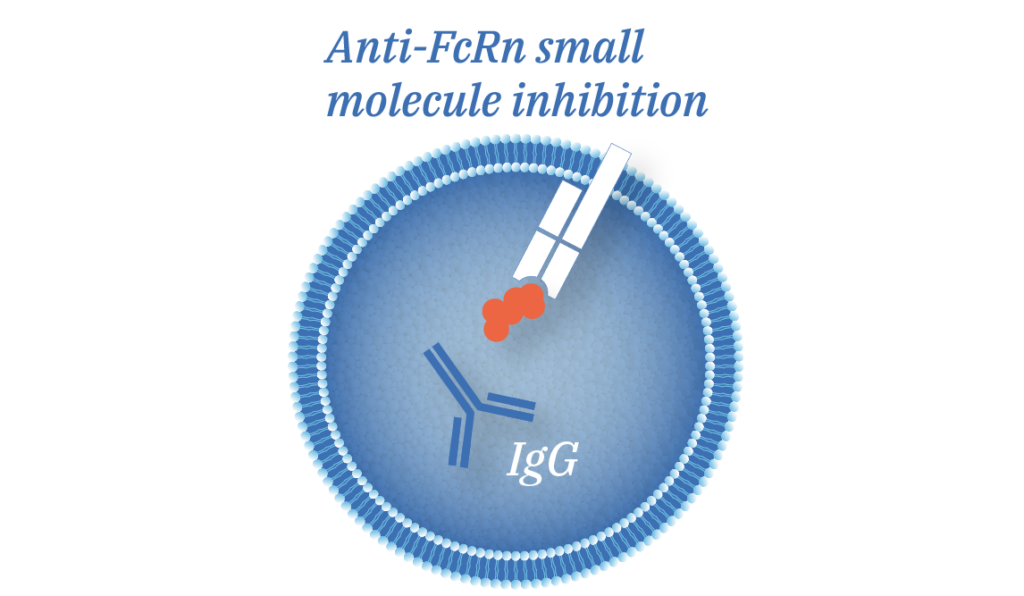
Thinking big about small molecule therapeutics
Generian is building a first-in-class drug discovery pipeline of small molecule drugs to address the shortcomings of biologics and improve the patient experience by increasing convenience and access.
We strive to discover and develop small molecule therapeutics for diseases with high unmet need—specifically areas dominated by biologics. Oral, small molecule therapeutics are more economically sustainable and allow for treatment titration in a way not possible with antibodies. This approach has the potential to improve the patient experience by increasing convenience and access while reducing cost to payors.


The Approach
By leveraging a unique and versatile drug discovery approach that can screen proteins of interest in their native cellular environment, we have the potential to discover small molecules against previously challenging to drug protein targets. By rapidly identifying target binders, Generian progresses candidates with greater mechanistic certainty and efficiency through highly translational phenotypic screening.

Pipeline
Generian is advancing a valuable pipeline of first-in-class drug candidates that therapeutically modulate target protein structure and/or dynamics resulting in functional inhibition or activation. Generian has programs for both clinically validated targets as well programs focused on novel targets through a research collaboration agreement with Astellas.

News
March 1, 2023
Generian Pharmaceuticals to Participate in the Cowen 43rd Annual Healthcare Conference
Generian Pharmaceuticals to Participate in the Cowen 43rd Annual Healthcare Conference
Pittsburgh, March 1, 2023 – Generian Pharmaceuticals, Inc., (“Generian”), a biopharmaceutical company discovering and developing orally bioavailable small molecule therapeutics in areas dominated by biologics, today announced that Hank Safferstein, Chief Executive Officer of Generian Pharmaceuticals, will host investor meetings at the Cowen 43rd Annual Healthcare Conference in Boston, MA, on Tuesday, March 7, 2023.
About Generian
Generian Pharmaceuticals is a preclinical biotechnology company focused on developing novel, orally available small molecule therapeutics for diseases with high unmet need—specifically areas dominated by biologics. By utilizing a proprietary platform, the company is advancing a pipeline of first in class drug candidates that therapeutically modulate target protein structure resulting in functional inhibition or activation. Generian has programs for both clinically validated targets as well as programs focused on novel targets under its collaboration agreement with Mitobridge, Inc. (a wholly-owned subsidiary of Astellas Pharma Inc.).
Learn more at www.generian.com.
Generian Contact:
Investor and Media inquiries
Argot Partners
Generian@argotpartners.com

February 8, 2023
Generian Achieves First Milestones in Mitobridge Collaboration
Generian Achieves First Milestones in Mitobridge Collaboration
Pittsburgh, PA and Cambridge, MA, February 8, 2023 – Generian Pharmaceuticals, Inc., a preclinical biopharmaceutical company discovering and developing first-in-class orally bioavailable small molecule therapeutics, announced today that it has achieved the first research milestones for two programs in development under its collaboration agreement with Mitobridge, Inc. (a wholly-owned subsidiary of Astellas Pharma Inc.).
The two programs that Generian is advancing are focused on the stabilization or degradation of two unrelated transcription factors. The milestone payments were generated based on the successful identification of hit compounds that impact the stability and activity of these two transcription factors. The small molecule hit series were identified through the use of a proprietary drug discovery platform and validated as target protein stabilizers or degraders in biologically relevant functional assays.
“We are extremely pleased with the rapid and remarkable progress made with our partners at Astellas on these two programs,” said Hank Safferstein, PhD, JD, Chief Executive Officer of Generian. “These hit series represent first-in-class compounds that directly bind to transcription factors for degradation or stabilization. We look forward to continuing our productive collaboration and leveraging our combined expertise and knowledge to develop and advance small molecule therapeutics for difficult to drug targets.”
“As a company focused on developing innovative treatments for patients around the world, we are extremely pleased that Generian achieved their first program milestones,” said David Barrett, Ph.D., Division Head and President of Mitobridge. “We continue to be very excited about, and value, our ongoing collaboration with them.”
In June 2022, Generian and Astellas entered into a collaboration and exclusive license agreement to identify novel small molecules that modulate target proteins through activation, stabilization or degradation as potential development candidates. Generian is eligible to receive additional milestone payments of approximately $180 million in addition to royalties on any global net sales.
About Generian
Generian Pharmaceuticals, which was formed by UPMC Enterprises, the innovation, commercialization and venture capital arm of UPMC, is a preclinical biotechnology company focused on developing novel small molecules to therapeutically modulate target proteins through activation, stabilization, or degradation. By utilizing a proprietary platform, the company is advancing a pipeline of first-in-class drugs for clinically meaningful, difficult-to-drug targets. Learn more at www.generian.com or follow us on LinkedIn.
About Mitobridge
Mitobridge Inc. was founded in 2013 with financing from MPM Capital, Longwood Fund, and Astellas Pharma’s Venture Management team, all sharing a vision for the promise of mitochondrial-targeted therapeutics. In January of 2018, Mitobridge was acquired by Astellas Pharma and is now Mitobridge, an Astellas Company. At Astellas, mitochondrial biology is one of our Primary Focuses, and this biology platform drives our commitment to bring new biological concepts into the clinic for rapid proof of concept.
About Astellas
Astellas Pharma Inc. is a pharmaceutical company conducting business in more than 70 countries around the world. We are promoting the Focus Area Approach that is designed to identify opportunities for the continuous creation of new drugs to address diseases with high unmet medical needs by focusing on Biology and Modality. Furthermore, we are also looking beyond our foundational Rx focus to create Rx+® healthcare solutions that combine our expertise and knowledge with cutting-edge technology in different fields of external partners. Through these efforts, Astellas stands on the forefront of healthcare change to turn innovative science into value for patients. For more information, please visit our website at https://www.astellas.com/en/.
Cautionary Notes
In this press release, statements made with respect to current plans, estimates, strategies and beliefs and other statements that are not historical facts are forward-looking statements about the future performance of Generian and/or Astellas. These statements are based on management’s current assumptions and beliefs in light of the information currently available to it and involve known and unknown risks and uncertainties. A number of factors could cause actual results to differ materially from those discussed in the forward-looking statements. Such factors include, but are not limited to: (i) changes in general economic conditions and in laws and regulations, relating to pharmaceutical markets, (ii) currency exchange rate fluctuations, (iii) delays in new product launches, (iv) the inability of Generian or Astellas to market existing and new products effectively, (v) the inability of Generian or Astellas to continue to effectively research and develop products accepted by customers in highly competitive markets, and (vi) infringements of relevant intellectual property rights by third parties. Information about pharmaceutical products (including products currently in development) which is included in this press release is not intended to constitute an advertisement or medical advice.
Generian Contact:
Investor and Media inquiries
Argot Partners
Generian@argotpartners.com
Astellas Contact:
Astellas Pharma Inc.
Corporate Advocacy & Relations
+81-3-3244-3201

June 29, 2022
Generian and Astellas Enter into Collaboration and Exclusive License Agreement to Discover and Develop Novel Small Molecules For Undruggable Targets
Generian and Astellas Enter into Collaboration and Exclusive License Agreement to Discover and Develop Novel Small Molecules For Undruggable Targets
Pittsburgh, PA and Cambridge, MA, June 29, 2022 – Generian Pharmaceuticals, Inc. (“Generian”) and Mitobridge, Inc. (a wholly owned subsidiary of Astellas Pharma Inc.) announced today that they have entered into a collaboration and exclusive license agreement to discover and develop novel small molecules for undruggable therapeutic targets by using a proprietary drug discovery platform for diseases that have limited treatment options.
Under the terms of the agreement, the companies will jointly conduct research and preclinical development activities to identify novel monovalent small molecules that modulate target proteins through activation, stabilization or degradation as potential development candidates. Astellas will be solely responsible for clinical development, manufacturing and commercialization of all products arising from the joint research activities. Generian will receive an upfront payment and is eligible to receive success-based milestone payments that could result in payments of over $180 million, along with single digit royalties on global net sales of those products.
“We are excited to collaborate with Astellas and believe our strategy can successfully mine for candidate drugs for therapeutically relevant targets that are currently considered undruggable,” said Hank Safferstein, PhD, JD, Chief Executive Officer of Generian. “Our small molecule discovery approach allows us to rapidly screen and identify potential drug candidates in an entirely new way in order to develop first-in-class medicines.”
“Our collaboration with Generian is an exciting and transformative opportunity to accelerate our drug discovery activities in the area of undruggable target space,” said David Barrett, Ph.D., Division Head and President of Mitobridge. “We are very excited to work with a world-class team of collaborators to deliver significant new treatment options for patients suffering from currently intractable or poorly served diseases.”
About Generian
Generian Pharmaceuticals, which was formed by UPMC Enterprises, the innovation, commercialization and venture capital arm of UPMC, is a private biotechnology company that is focused on developing small molecules to therapeutically modulate protein stability. By utilizing a proprietary platform, the company is advancing a pipeline of first-in-class drugs for clinically meaningful, difficult-to-drug targets. Learn more at www.generian.com or follow us on LinkedIn.
About Mitobridge
Mitobridge Inc. was founded in 2013 with financing from MPM Capital, Longwood Fund, and Astellas Pharma’s Venture Management team, all sharing a vision for the promise of mitochondrial-targeted therapeutics. In January of 2018, Mitobridge was acquired by Astellas Pharma and is now Mitobridge, an Astellas Company. At Astellas, mitochondrial biology is one of our Primary Focuses, and this biology platform drives our commitment to bring new biological concepts into the clinic for rapid proof of concept.
About Astellas
Astellas Pharma Inc. is a pharmaceutical company conducting business in more than 70 countries around the world. We are promoting the Focus Area Approach that is designed to identify opportunities for the continuous creation of new drugs to address diseases with high unmet medical needs by focusing on Biology and Modality. Furthermore, we are also looking beyond our foundational Rx focus to create Rx+® healthcare solutions that combine our expertise and knowledge with cutting-edge technology in different fields of external partners. Through these efforts, Astellas stands on the forefront of healthcare change to turn innovative science into value for patients. For more information, please visit our website at https://www.astellas.com/en.
Astellas Cautionary Notes
In this press release, statements made with respect to current plans, estimates, strategies and beliefs and other statements that are not historical facts are forward-looking statements about the future performance of Astellas. These statements are based on management’s current assumptions and beliefs in light of the information currently available to it and involve known and unknown risks and uncertainties. A number of factors could cause actual results to differ materially from those discussed in the forward-looking statements. Such factors include, but are not limited to: (i) changes in general economic conditions and in laws and regulations, relating to pharmaceutical markets, (ii) currency exchange rate fluctuations, (iii) delays in new product launches, (iv) the inability of Astellas to market existing and new products effectively, (v) the inability of Astellas to continue to effectively research and develop products accepted by customers in highly competitive markets, and (vi) infringements of Astellas’ intellectual property rights by third parties. Information about pharmaceutical products (including products currently in development) which is included in this press release is not intended to constitute an advertisement or medical advice.
###
Generian Contact:
Media and all other inquiries
info@generian.com
Astellas Contact:
Astellas Pharma Inc.
Corporate Advocacy & Relations
+81-3-3244-3201
